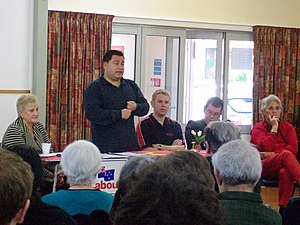Charities brace for new homeless spike in New Zealand...
Social services are bracing for another spike in homelessness as
Housing New Zealand withdraws from looking after its tenants' social
needs.
Housing NZ chief executive Dr Lesley McTurk has told the corporation's
1100 staff that staff numbers will be cut by about 100 as the agency's
focus narrows down to managing its 70,000 state houses.
"We will no longer have a role to assist individuals with their wider
social needs. We will concentrate on their accommodation needs," she
said.
Most tenancy managers will become "fully mobile" by next September,
reporting from their cars to five home bases in central and South
Auckland, Tauranga, Wellington and Christchurch.
All tenant calls to tenancy managers will be diverted to two national call centres.
Some 144 jobs will be axed and 339 existing staff will compete for
187 other jobs. This overall cut of 296 will be offset by 130 new jobs,
including a new 37-person call centre in Auckland as well as the
existing centre in Porirua.
The agency has also axed work in its eight "community renewal" projects
in the Auckland suburbs of Northcote, Talbot Park,
Wiri and Clendon and
in
Otangarei (Whangarei), Fordlands (Rotorua), Porirua East
(Wellington) and Aranui (Christchurch).
"The corporation will continue to deliver tenancy management services in
these areas, but there will be no new funding for community
development," it said.
John McCarthy, social services manager for the
Methodist Mission's
Lifewise agency which looks after Auckland's homeless, said the changes
would drive more vulnerable tenants on to the streets.
"The great risk for organisations like us and others working in the area
of homelessness and emergency accommodation is that we are going to see
more people in Housing NZ poorly supported, which will put more
tenancies at risk, result in more evictions and more people coming out
of Housing NZ accommodation and potentially more homelessness," he said.
Labour housing spokeswoman
Moana Mackey said a Labour Government would
reverse the changes and turn Housing NZ back into "a social housing
provider rather than just another landlord".
Historian Ben Schrader, who wrote a history of
state housing in 2005,
said social support became an increasing part of Housing NZ's work as
its role shrank from housing low-income workers in the 1930s and 40s to
being a "last resort" provider for people such as beneficiaries, those
with mental health problems, ex-prisoners and refugees.
But a consultation document issued to staff a week ago says the agency
would "stop delivering social services that should be delivered by other
organisations".
"Tenancy managers and case managers frequently find themselves following
up with many other agencies such as
Child, Youth and Family [CYFS] on
child safety concerns; district health boards on health; budget
services; school truancy issues and so on," the document says.
"The
Ministry of Social Development [MSD] will act as a conduit for all
other agencies that need to provide social support to the corporation's
tenants."
Dr McTurk said all existing Housing NZ branches would be absorbed
gradually into MSD's "Community Link" centres, which already bring
together Work and Income, CYFS and sometimes other agencies in 50
locations. A further 30 are planned in the next year.
Narrowed focus
* HNZ "will no longer have a role to assist individuals with their wider social needs".
* Tenant calls to tenancy managers will be diverted to a call centre.
* Most tenancy managers will operate from their cars.
* Staff cut by about 100.
Acknowledgements: Simon Collins
| Email Simon
 Image via Wikipedia
Image via Wikipedia Image via Wikipedia
Image via Wikipedia Image via Wikipedia
Image via Wikipedia



 Image via Wikipedia
Image via Wikipedia Image via Wikipedia
Image via Wikipedia


 The Judge has imposed permanent name suppression. The Judge is a joke!
The Judge has imposed permanent name suppression. The Judge is a joke!